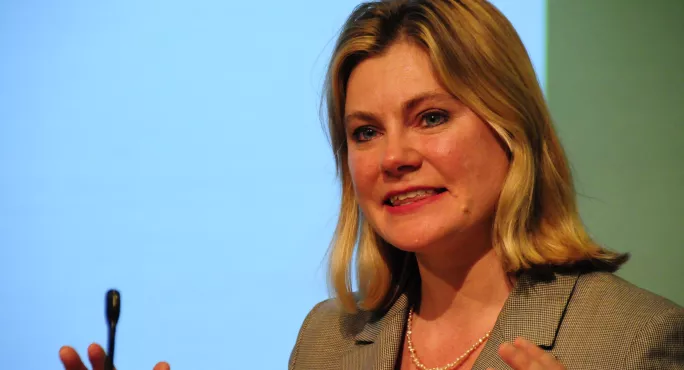- Home
- Justine Greening resigns from government
Justine Greening resigns from government

Justine Greening has left the government after 18 months as education secretary.
Her resignation came after she spent two-and-a-half-hours at 10 Downing Street this evening, where she reportedly refused a move to the Department for Work and Pensions.
She told the BBC: ”‘Social mobility matters to me and our country more than a ministerial career - I’ll continue to work outside of government to do everything I can to create a country for the first time that has equality of opportunity for young people wherever they are growing up.”
No 10 sources said Mrs May is “disappointed” but respects Ms Greening’s decision to leave the government.
- Damian Hinds appointed education secretary
- Who is Damian Hinds?
- Ten of Justine Greening’s hits and misses as education secretary
- Justine Greening had one of the shortest tenures as education secretary
- Bulging in-tray for new education secretary
Geoff Barton, general secretary of the Association of School and College Leaders, expressed “disappointment” that Ms Greening had left government.
“We are very sorry to see the departure of Justine Greening as education secretary,” he said. “She has tried hard to tackle the school funding crisis, without any help from the chancellor or prime minister.
“She has demonstrated an absolute commitment to social mobility, to addressing the serious difficulties in teacher recruitment and retention, and to developing education policy on the basis of evidence. She set an ambitious agenda on flexible working which challenged the profession to do more to modernise itself.
“All of this was important work in progress. It is very disappointing therefore to lose her as secretary of state, particularly at a time when the education sector needs stability after the policy pyrotechnics and structural tinkering of recent years.”
Honour & privilege to serve in Govt since 2010. Social mobility matters to me & our country more than my ministerial career. I’ll continue to do everything I can to create a country that has equality of opportunity for young people & I’ll keep working hard as MP for Putney.
- Justine Greening (@JustineGreening) January 8, 2018
Mary Bousted and Kevin Courtney, joint general secretaries of the National Education Union, said they had a “good relationship” with Ms Greening, and added: “She listened to teachers and the unions, although she was not able to make the necessary changes in education policy.”
Her departure from Sanctuary Buildings follows a fortnight of speculation about her future, with claims she had “sided too strongly with the unions” instead of embracing Tory school reforms, and that the prime minister found her “patronising”.
Greening’s achievements
During her time in office, Ms Greening secured an additional £1.3 billion for schools for two years - funded from existing DfE resources - and has overseen the introduction of the national funding formula for schools.
She has also made improving social mobility a key priority, creating 12 ”opportunity areas” in social mobility cold spots, and last month launching the government’s social mobility action plan.
However, she was widely seen as unenthusiastic about Theresa May’s personal priority of creating new grammar schools, which was a key part of the prime minister’s plans to increase social mobility, and was only ditched when the Tories lost their Commons majority last year.
Ms Greening was also viewed as a more pragmatic education secretary and as having a less ideological agenda than her predecessors Michael Gove and Nicky Morgan.
She narrowed the focus of the free schools programme, as well as cutting its budget to help increase funding across the state school sector, and put a bigger emphasis on standards than structures.
Last week, union leaders praised Ms Greening’s record and told Tes they were worried about instability and changes to the school system caused by a new face at the top of the DfE.
Her departure is likely to raise concerns among teaching unions about a return to a more forceful programme of academisation and free schools, and even the extension of academic selection through the encouragement of existing grammar schools to expand or set up annexes.
Want to keep up with the latest education news and opinion? Follow Tes on Twitter and Instagram, and like Tes on Facebook
Keep reading for just £1 per month
You've reached your limit of free articles this month. Subscribe for £1 per month for three months and get:
- Unlimited access to all Tes magazine content
- Exclusive subscriber-only stories
- Award-winning email newsletters



